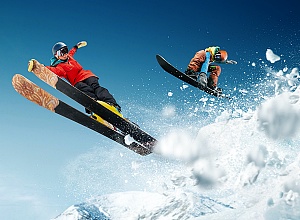Having an audience has a different effect on men compared to women, found a German study on biathlon athletes, reports MedicalBrief. In the presence of an audience male biathletes improve their performance in conditioning tasks (skiing) but deteriorate in co-ordination tasks (shooting), while females show the reverse pattern.
The study was published in the journal Psychology of Sport and Exercise.
Social facilitation theory states that a person's performance is affected if other people watch them. The mere presence of an audience improves the performance of simple tasks, especially those that require stamina.
“The studies have been relatively clear so far, but the results are more heterogeneous when it comes to more complex coordinative tasks,” said Amelie Heinrichfrom the Institute of Sports Scienceat Martin-Luther-Universität Halle-Wittenberg (MLU). In general, it is assumed that performance tends to deteriorate when there is an audience.
Heinrich is a sports psychology expert who coaches Germany's junior biathlon squad. In her new study she took advantage of the special situation in sport caused by the coronavirus.
“The pandemic offers a unique opportunity to study an audience's influence outside of experimental conditions in the real world,” she said. She compared the running times and shooting successes of male and female biathletes from the 2018/2019 season with their performances in the 2020 season in the sprint and mass start events.
“The men's results were as expected: they ran faster with an audience present, but performed more poorly in shooting,” Heinrich observed.
While cross-country skiing mainly requires stamina, shooting is a co-ordinative task. “Interestingly, it was the other way around for women. They ran slower in the presence of spectators, but on average, it took them an entire second less to make their shot and, at least in the sprint, their scoring performance was five percent higher.”
The researchers believe the results are not only due to a fluctuation in the athletes' performance. The study had a good basis of evidence, with 83 (sprint) and 34 (mass start) World Cup biathletes, and the same tendency was shown for both disciplines.
“To our knowledge, this is the first time a study was able to show a different effect of the audience on men and women,” said Professor Oliver Stoll, head of the sports psychology section at MLU. Most of the previous studies on the topic have been conducted with men mostly.
“Our study raises questions about the generalisation of the social facilitation theory and indicates there might be a previously unknown difference between men and women,” said Heinrich, adding that this should be investigated more thoroughly in further studies for other sports that also contain both stamina-related and coordination-related elements.
So far, the researchers can only speculate about the reasons for the possible gender-specific performance differences in response to audiences or the lack of. “It is possible that gender-specific stereotypes play a role,” said Heinrich.
For example, men are considered to be physically stronger, a stereotype that could be reinforced by the presence of spectators. Some studies also show that women react more sensitively to feedback. In any case, according to Heinrich, the findings show once again that gender should be taken into account in psychological studies as a possible influencing factor.
Study details
Selection bias in social facilitation theory? Audience effects on elite biathletes' performance are gender-specific
Authors: Amelie Heinrich, Florian Müller, Oliver Stoll, Rouwen Cañal-Bruland
Published in Science Direct in July 2021
Highlights
- Social facilitation effects in elite biathlon are task- and gender-specific
- Male biathletes improve their performance in conditioning task (skiing) but deteriorate in co-ordination task (shooting) in the presence of an audience; female athletes show the reverse pattern
- Sample selection bias in past research (<1/3 female) may explain the results, thereby questioning the generalizability of social facilitation theory
Abstract
Social facilitation proves robust in conditioning tasks (e.g., running), yet in coordination tasks (e.g., rifle-shooting) some studies report performance deterioration. Recent Biathlon World Cup data offered the unique opportunity to test this task-specificity (conditioning = cross country skiing, coordination = rifle-shooting).
Audience restrictions due to COVID-19 allowed to compare athletes' performance in the absence (2020) and presence (season 2018/2019) of an audience. Gender-specific regulations (e.g., course length) necessitated the inclusion of gender as additional factor.
Conclusion
Results of 83 (sprint competition) and 34 (mass start competition) biathletes revealed that task-specific social facilitation is moderated by gender: In the presence of an audience male biathletes showed performance improvements in the conditioning task and performance deteriorations in the coordination task; female biathletes showed the reverse pattern.
This gender dependency may have gone unnoticed in the past due to sample selection bias (<1/3 female), thereby questioning the generalizability of social facilitation theory.
Science Daily story – Sports: Men and women react differently to a missing audience (Open access)
Full study (Restricted access)
See also from MedicalBrief archives:
Body clock's role in sporting performance
Four elite SA athletes share their stories on depression
Female athletes less likely to choke under pressure

